Refugees as Vulnerable Group: Poverty, Health, and Human Rights
VerifiedAdded on 2022/08/20
|7
|1746
|286
Essay
AI Summary
This essay investigates the vulnerability of refugees, particularly in the context of Australia's policies and practices. It explores the factors that contribute to refugees' vulnerability, including poverty, limited access to healthcare, and the psychological impact of trauma. The essay highlights the challenges faced by refugees, such as discrimination, mandatory and offshore detention, and the complexities of international human rights law. It examines the roles of various stakeholders, including the Australian government, UNHCR, and international human rights committees, in addressing the needs of refugees. The essay concludes by emphasizing the importance of meeting the needs of refugees, upholding human rights, and implementing long-term solutions for refugee protection, including the right to health of every single person along with the significance of belief in the strategy as well as, in addition, implement the policies and programs at international, national, along with local levels.
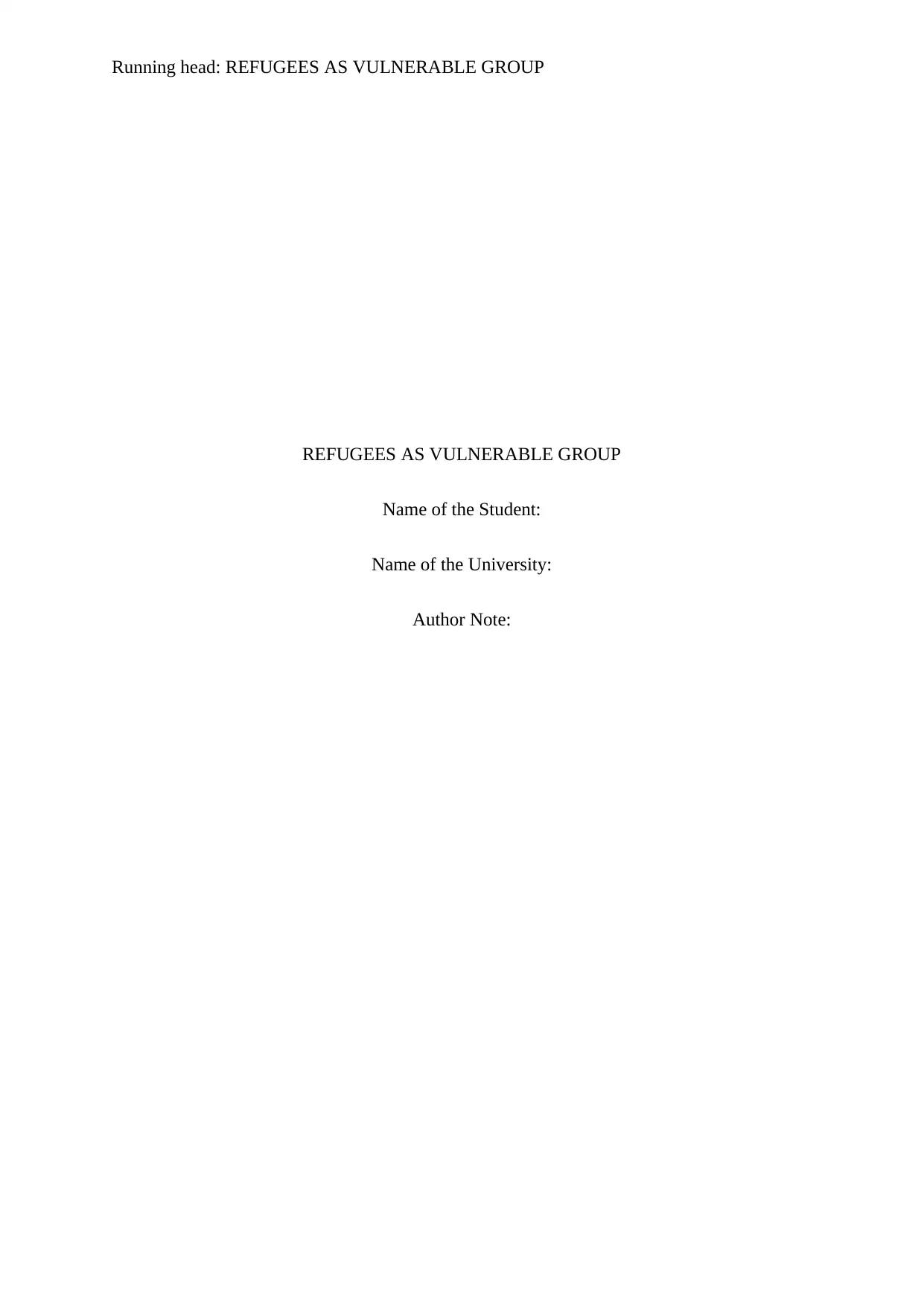
Running head: REFUGEES AS VULNERABLE GROUP
REFUGEES AS VULNERABLE GROUP
Name of the Student:
Name of the University:
Author Note:
REFUGEES AS VULNERABLE GROUP
Name of the Student:
Name of the University:
Author Note:
Paraphrase This Document
Need a fresh take? Get an instant paraphrase of this document with our AI Paraphraser
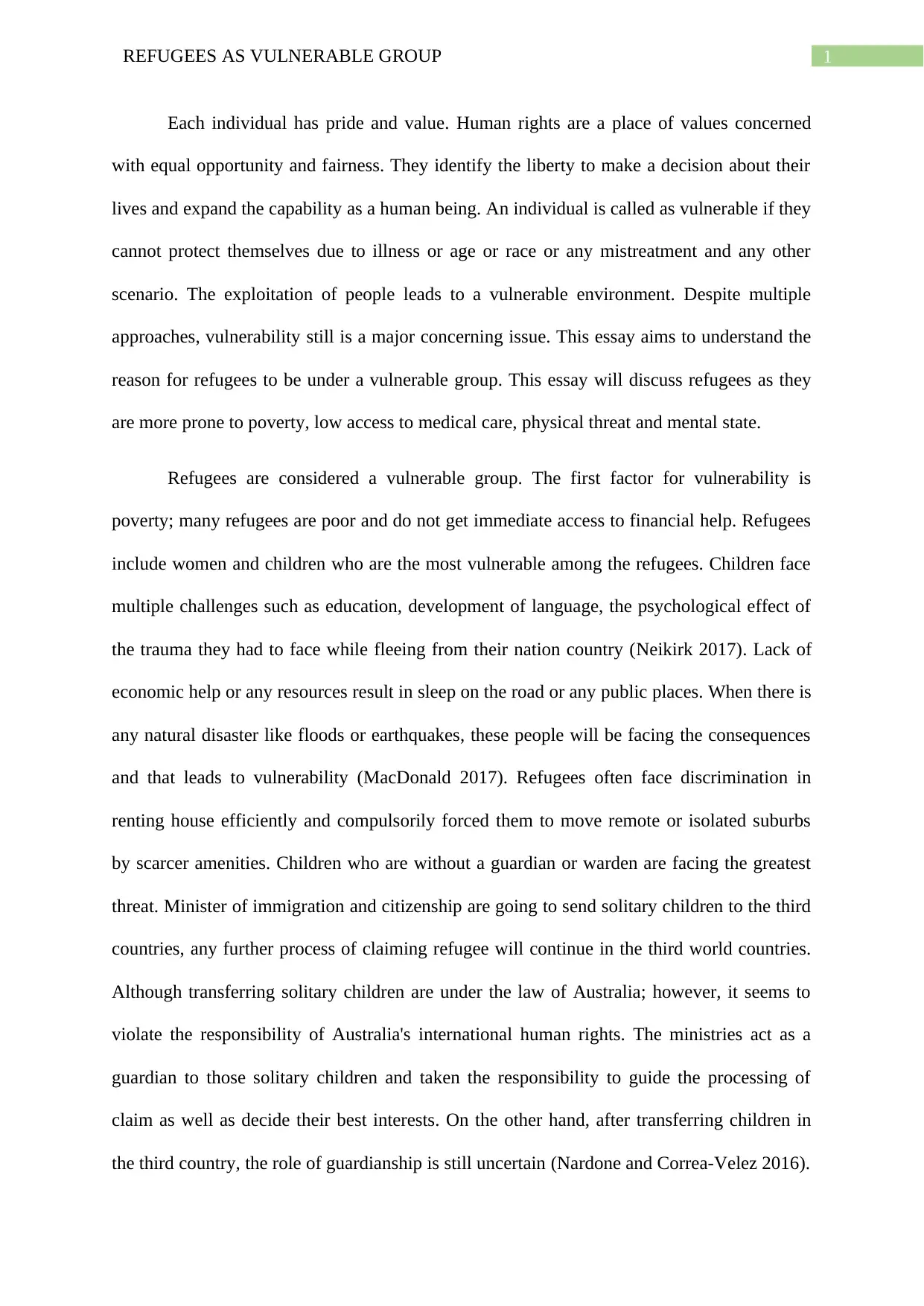
1REFUGEES AS VULNERABLE GROUP
Each individual has pride and value. Human rights are a place of values concerned
with equal opportunity and fairness. They identify the liberty to make a decision about their
lives and expand the capability as a human being. An individual is called as vulnerable if they
cannot protect themselves due to illness or age or race or any mistreatment and any other
scenario. The exploitation of people leads to a vulnerable environment. Despite multiple
approaches, vulnerability still is a major concerning issue. This essay aims to understand the
reason for refugees to be under a vulnerable group. This essay will discuss refugees as they
are more prone to poverty, low access to medical care, physical threat and mental state.
Refugees are considered a vulnerable group. The first factor for vulnerability is
poverty; many refugees are poor and do not get immediate access to financial help. Refugees
include women and children who are the most vulnerable among the refugees. Children face
multiple challenges such as education, development of language, the psychological effect of
the trauma they had to face while fleeing from their nation country (Neikirk 2017). Lack of
economic help or any resources result in sleep on the road or any public places. When there is
any natural disaster like floods or earthquakes, these people will be facing the consequences
and that leads to vulnerability (MacDonald 2017). Refugees often face discrimination in
renting house efficiently and compulsorily forced them to move remote or isolated suburbs
by scarcer amenities. Children who are without a guardian or warden are facing the greatest
threat. Minister of immigration and citizenship are going to send solitary children to the third
countries, any further process of claiming refugee will continue in the third world countries.
Although transferring solitary children are under the law of Australia; however, it seems to
violate the responsibility of Australia's international human rights. The ministries act as a
guardian to those solitary children and taken the responsibility to guide the processing of
claim as well as decide their best interests. On the other hand, after transferring children in
the third country, the role of guardianship is still uncertain (Nardone and Correa-Velez 2016).
Each individual has pride and value. Human rights are a place of values concerned
with equal opportunity and fairness. They identify the liberty to make a decision about their
lives and expand the capability as a human being. An individual is called as vulnerable if they
cannot protect themselves due to illness or age or race or any mistreatment and any other
scenario. The exploitation of people leads to a vulnerable environment. Despite multiple
approaches, vulnerability still is a major concerning issue. This essay aims to understand the
reason for refugees to be under a vulnerable group. This essay will discuss refugees as they
are more prone to poverty, low access to medical care, physical threat and mental state.
Refugees are considered a vulnerable group. The first factor for vulnerability is
poverty; many refugees are poor and do not get immediate access to financial help. Refugees
include women and children who are the most vulnerable among the refugees. Children face
multiple challenges such as education, development of language, the psychological effect of
the trauma they had to face while fleeing from their nation country (Neikirk 2017). Lack of
economic help or any resources result in sleep on the road or any public places. When there is
any natural disaster like floods or earthquakes, these people will be facing the consequences
and that leads to vulnerability (MacDonald 2017). Refugees often face discrimination in
renting house efficiently and compulsorily forced them to move remote or isolated suburbs
by scarcer amenities. Children who are without a guardian or warden are facing the greatest
threat. Minister of immigration and citizenship are going to send solitary children to the third
countries, any further process of claiming refugee will continue in the third world countries.
Although transferring solitary children are under the law of Australia; however, it seems to
violate the responsibility of Australia's international human rights. The ministries act as a
guardian to those solitary children and taken the responsibility to guide the processing of
claim as well as decide their best interests. On the other hand, after transferring children in
the third country, the role of guardianship is still uncertain (Nardone and Correa-Velez 2016).
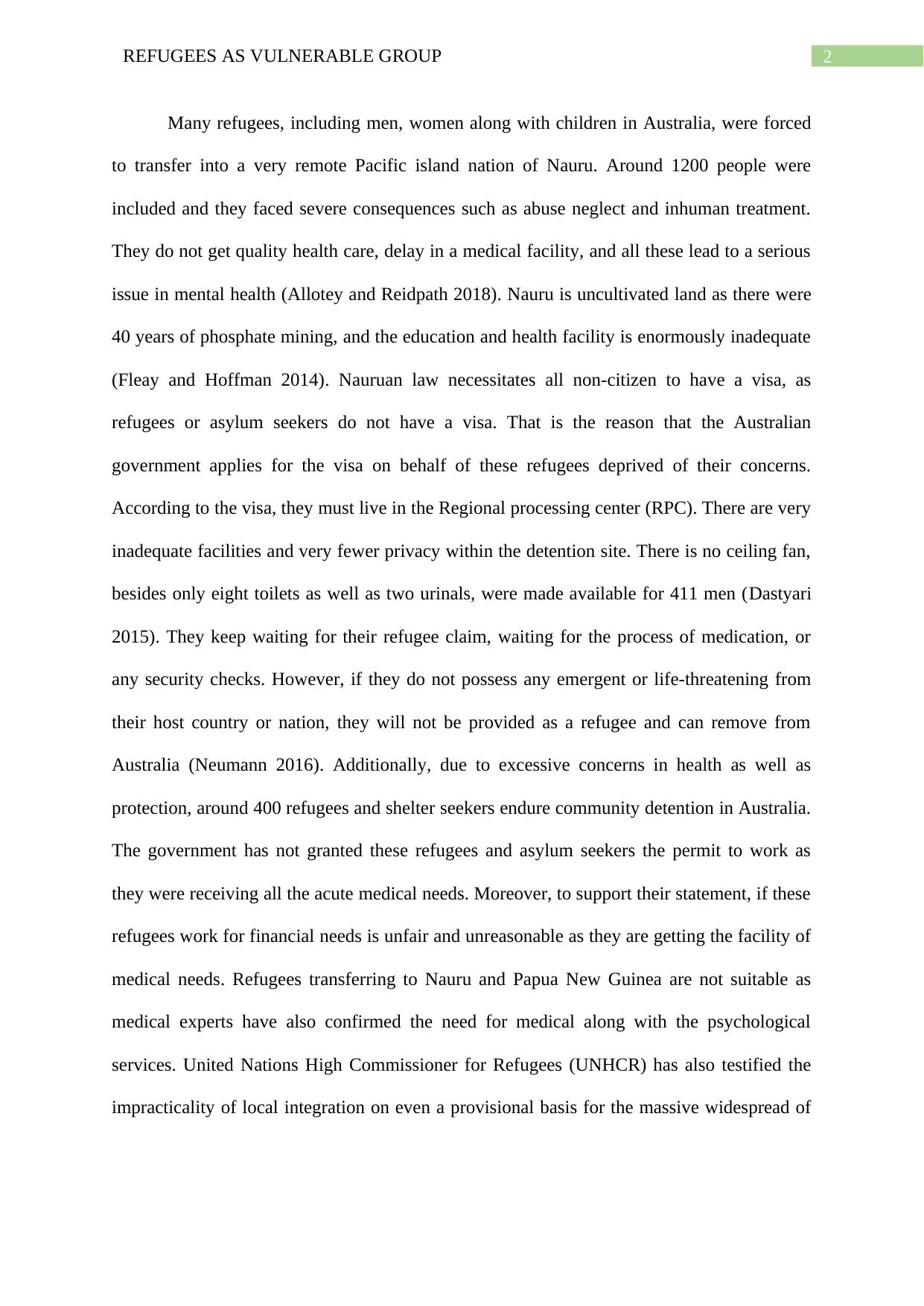
2REFUGEES AS VULNERABLE GROUP
Many refugees, including men, women along with children in Australia, were forced
to transfer into a very remote Pacific island nation of Nauru. Around 1200 people were
included and they faced severe consequences such as abuse neglect and inhuman treatment.
They do not get quality health care, delay in a medical facility, and all these lead to a serious
issue in mental health (Allotey and Reidpath 2018). Nauru is uncultivated land as there were
40 years of phosphate mining, and the education and health facility is enormously inadequate
(Fleay and Hoffman 2014). Nauruan law necessitates all non-citizen to have a visa, as
refugees or asylum seekers do not have a visa. That is the reason that the Australian
government applies for the visa on behalf of these refugees deprived of their concerns.
According to the visa, they must live in the Regional processing center (RPC). There are very
inadequate facilities and very fewer privacy within the detention site. There is no ceiling fan,
besides only eight toilets as well as two urinals, were made available for 411 men (Dastyari
2015). They keep waiting for their refugee claim, waiting for the process of medication, or
any security checks. However, if they do not possess any emergent or life-threatening from
their host country or nation, they will not be provided as a refugee and can remove from
Australia (Neumann 2016). Additionally, due to excessive concerns in health as well as
protection, around 400 refugees and shelter seekers endure community detention in Australia.
The government has not granted these refugees and asylum seekers the permit to work as
they were receiving all the acute medical needs. Moreover, to support their statement, if these
refugees work for financial needs is unfair and unreasonable as they are getting the facility of
medical needs. Refugees transferring to Nauru and Papua New Guinea are not suitable as
medical experts have also confirmed the need for medical along with the psychological
services. United Nations High Commissioner for Refugees (UNHCR) has also testified the
impracticality of local integration on even a provisional basis for the massive widespread of
Many refugees, including men, women along with children in Australia, were forced
to transfer into a very remote Pacific island nation of Nauru. Around 1200 people were
included and they faced severe consequences such as abuse neglect and inhuman treatment.
They do not get quality health care, delay in a medical facility, and all these lead to a serious
issue in mental health (Allotey and Reidpath 2018). Nauru is uncultivated land as there were
40 years of phosphate mining, and the education and health facility is enormously inadequate
(Fleay and Hoffman 2014). Nauruan law necessitates all non-citizen to have a visa, as
refugees or asylum seekers do not have a visa. That is the reason that the Australian
government applies for the visa on behalf of these refugees deprived of their concerns.
According to the visa, they must live in the Regional processing center (RPC). There are very
inadequate facilities and very fewer privacy within the detention site. There is no ceiling fan,
besides only eight toilets as well as two urinals, were made available for 411 men (Dastyari
2015). They keep waiting for their refugee claim, waiting for the process of medication, or
any security checks. However, if they do not possess any emergent or life-threatening from
their host country or nation, they will not be provided as a refugee and can remove from
Australia (Neumann 2016). Additionally, due to excessive concerns in health as well as
protection, around 400 refugees and shelter seekers endure community detention in Australia.
The government has not granted these refugees and asylum seekers the permit to work as
they were receiving all the acute medical needs. Moreover, to support their statement, if these
refugees work for financial needs is unfair and unreasonable as they are getting the facility of
medical needs. Refugees transferring to Nauru and Papua New Guinea are not suitable as
medical experts have also confirmed the need for medical along with the psychological
services. United Nations High Commissioner for Refugees (UNHCR) has also testified the
impracticality of local integration on even a provisional basis for the massive widespread of
⊘ This is a preview!⊘
Do you want full access?
Subscribe today to unlock all pages.

Trusted by 1+ million students worldwide
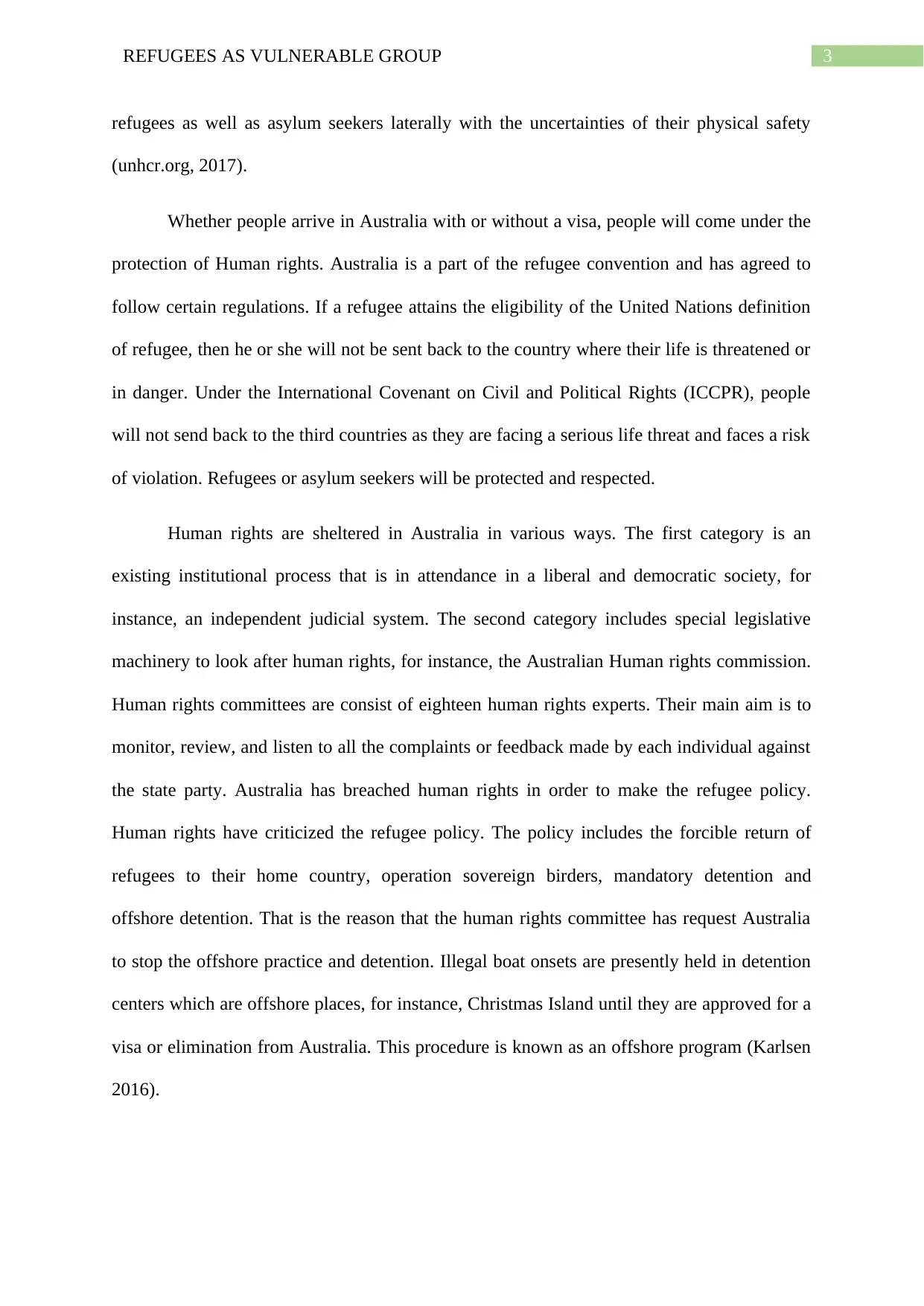
3REFUGEES AS VULNERABLE GROUP
refugees as well as asylum seekers laterally with the uncertainties of their physical safety
(unhcr.org, 2017).
Whether people arrive in Australia with or without a visa, people will come under the
protection of Human rights. Australia is a part of the refugee convention and has agreed to
follow certain regulations. If a refugee attains the eligibility of the United Nations definition
of refugee, then he or she will not be sent back to the country where their life is threatened or
in danger. Under the International Covenant on Civil and Political Rights (ICCPR), people
will not send back to the third countries as they are facing a serious life threat and faces a risk
of violation. Refugees or asylum seekers will be protected and respected.
Human rights are sheltered in Australia in various ways. The first category is an
existing institutional process that is in attendance in a liberal and democratic society, for
instance, an independent judicial system. The second category includes special legislative
machinery to look after human rights, for instance, the Australian Human rights commission.
Human rights committees are consist of eighteen human rights experts. Their main aim is to
monitor, review, and listen to all the complaints or feedback made by each individual against
the state party. Australia has breached human rights in order to make the refugee policy.
Human rights have criticized the refugee policy. The policy includes the forcible return of
refugees to their home country, operation sovereign birders, mandatory detention and
offshore detention. That is the reason that the human rights committee has request Australia
to stop the offshore practice and detention. Illegal boat onsets are presently held in detention
centers which are offshore places, for instance, Christmas Island until they are approved for a
visa or elimination from Australia. This procedure is known as an offshore program (Karlsen
2016).
refugees as well as asylum seekers laterally with the uncertainties of their physical safety
(unhcr.org, 2017).
Whether people arrive in Australia with or without a visa, people will come under the
protection of Human rights. Australia is a part of the refugee convention and has agreed to
follow certain regulations. If a refugee attains the eligibility of the United Nations definition
of refugee, then he or she will not be sent back to the country where their life is threatened or
in danger. Under the International Covenant on Civil and Political Rights (ICCPR), people
will not send back to the third countries as they are facing a serious life threat and faces a risk
of violation. Refugees or asylum seekers will be protected and respected.
Human rights are sheltered in Australia in various ways. The first category is an
existing institutional process that is in attendance in a liberal and democratic society, for
instance, an independent judicial system. The second category includes special legislative
machinery to look after human rights, for instance, the Australian Human rights commission.
Human rights committees are consist of eighteen human rights experts. Their main aim is to
monitor, review, and listen to all the complaints or feedback made by each individual against
the state party. Australia has breached human rights in order to make the refugee policy.
Human rights have criticized the refugee policy. The policy includes the forcible return of
refugees to their home country, operation sovereign birders, mandatory detention and
offshore detention. That is the reason that the human rights committee has request Australia
to stop the offshore practice and detention. Illegal boat onsets are presently held in detention
centers which are offshore places, for instance, Christmas Island until they are approved for a
visa or elimination from Australia. This procedure is known as an offshore program (Karlsen
2016).
Paraphrase This Document
Need a fresh take? Get an instant paraphrase of this document with our AI Paraphraser
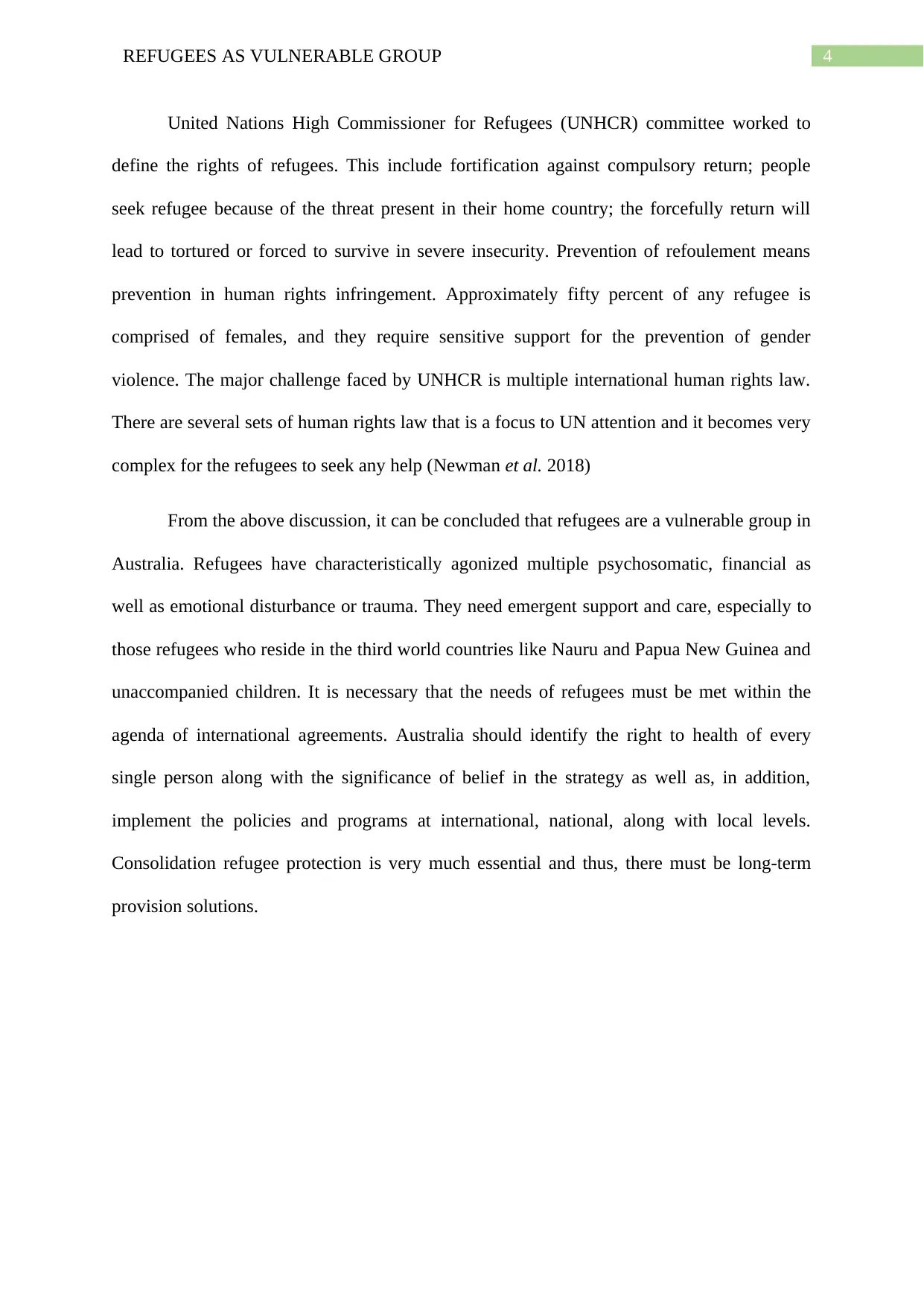
4REFUGEES AS VULNERABLE GROUP
United Nations High Commissioner for Refugees (UNHCR) committee worked to
define the rights of refugees. This include fortification against compulsory return; people
seek refugee because of the threat present in their home country; the forcefully return will
lead to tortured or forced to survive in severe insecurity. Prevention of refoulement means
prevention in human rights infringement. Approximately fifty percent of any refugee is
comprised of females, and they require sensitive support for the prevention of gender
violence. The major challenge faced by UNHCR is multiple international human rights law.
There are several sets of human rights law that is a focus to UN attention and it becomes very
complex for the refugees to seek any help (Newman et al. 2018)
From the above discussion, it can be concluded that refugees are a vulnerable group in
Australia. Refugees have characteristically agonized multiple psychosomatic, financial as
well as emotional disturbance or trauma. They need emergent support and care, especially to
those refugees who reside in the third world countries like Nauru and Papua New Guinea and
unaccompanied children. It is necessary that the needs of refugees must be met within the
agenda of international agreements. Australia should identify the right to health of every
single person along with the significance of belief in the strategy as well as, in addition,
implement the policies and programs at international, national, along with local levels.
Consolidation refugee protection is very much essential and thus, there must be long-term
provision solutions.
United Nations High Commissioner for Refugees (UNHCR) committee worked to
define the rights of refugees. This include fortification against compulsory return; people
seek refugee because of the threat present in their home country; the forcefully return will
lead to tortured or forced to survive in severe insecurity. Prevention of refoulement means
prevention in human rights infringement. Approximately fifty percent of any refugee is
comprised of females, and they require sensitive support for the prevention of gender
violence. The major challenge faced by UNHCR is multiple international human rights law.
There are several sets of human rights law that is a focus to UN attention and it becomes very
complex for the refugees to seek any help (Newman et al. 2018)
From the above discussion, it can be concluded that refugees are a vulnerable group in
Australia. Refugees have characteristically agonized multiple psychosomatic, financial as
well as emotional disturbance or trauma. They need emergent support and care, especially to
those refugees who reside in the third world countries like Nauru and Papua New Guinea and
unaccompanied children. It is necessary that the needs of refugees must be met within the
agenda of international agreements. Australia should identify the right to health of every
single person along with the significance of belief in the strategy as well as, in addition,
implement the policies and programs at international, national, along with local levels.
Consolidation refugee protection is very much essential and thus, there must be long-term
provision solutions.
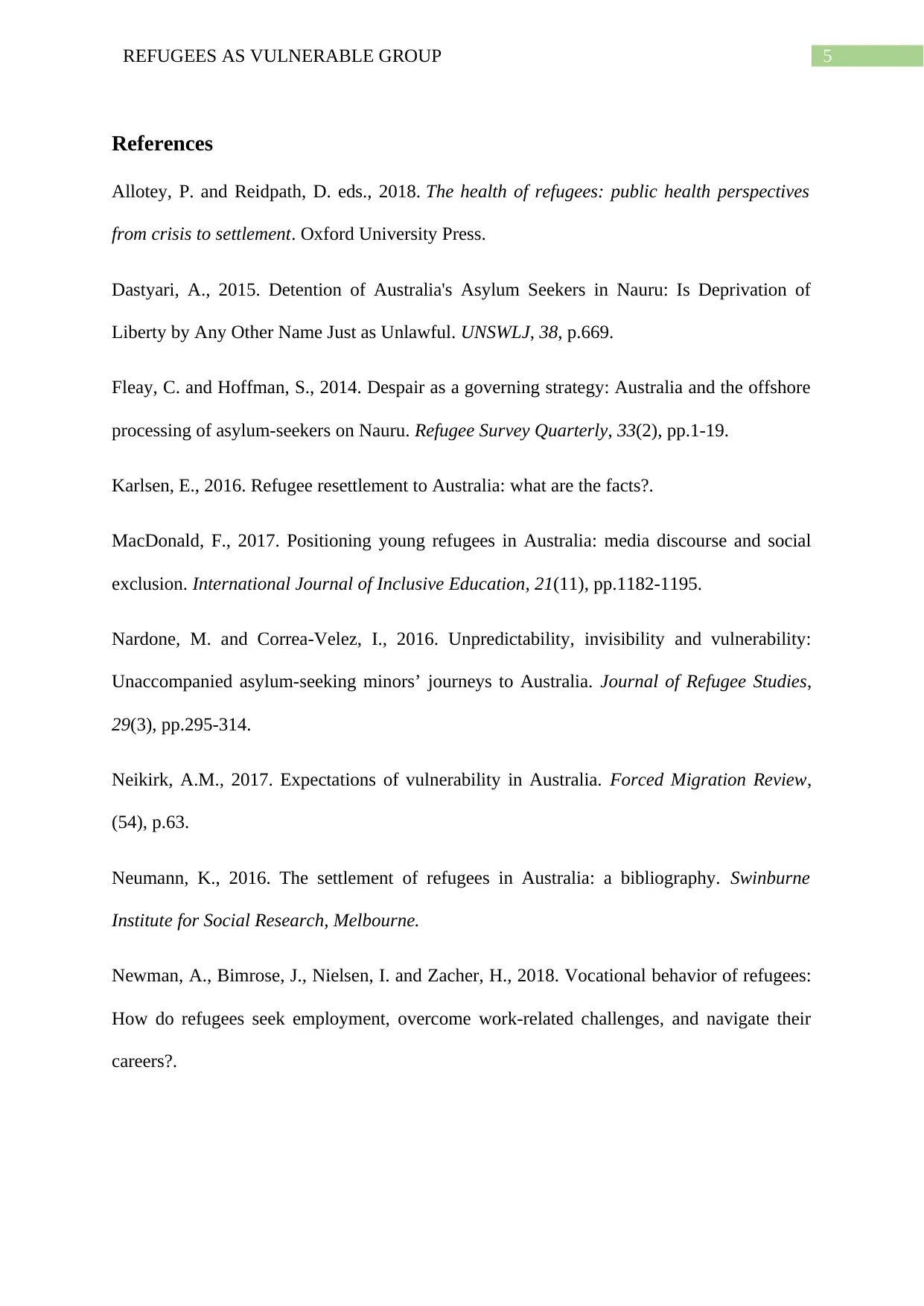
5REFUGEES AS VULNERABLE GROUP
References
Allotey, P. and Reidpath, D. eds., 2018. The health of refugees: public health perspectives
from crisis to settlement. Oxford University Press.
Dastyari, A., 2015. Detention of Australia's Asylum Seekers in Nauru: Is Deprivation of
Liberty by Any Other Name Just as Unlawful. UNSWLJ, 38, p.669.
Fleay, C. and Hoffman, S., 2014. Despair as a governing strategy: Australia and the offshore
processing of asylum-seekers on Nauru. Refugee Survey Quarterly, 33(2), pp.1-19.
Karlsen, E., 2016. Refugee resettlement to Australia: what are the facts?.
MacDonald, F., 2017. Positioning young refugees in Australia: media discourse and social
exclusion. International Journal of Inclusive Education, 21(11), pp.1182-1195.
Nardone, M. and Correa-Velez, I., 2016. Unpredictability, invisibility and vulnerability:
Unaccompanied asylum-seeking minors’ journeys to Australia. Journal of Refugee Studies,
29(3), pp.295-314.
Neikirk, A.M., 2017. Expectations of vulnerability in Australia. Forced Migration Review,
(54), p.63.
Neumann, K., 2016. The settlement of refugees in Australia: a bibliography. Swinburne
Institute for Social Research, Melbourne.
Newman, A., Bimrose, J., Nielsen, I. and Zacher, H., 2018. Vocational behavior of refugees:
How do refugees seek employment, overcome work-related challenges, and navigate their
careers?.
References
Allotey, P. and Reidpath, D. eds., 2018. The health of refugees: public health perspectives
from crisis to settlement. Oxford University Press.
Dastyari, A., 2015. Detention of Australia's Asylum Seekers in Nauru: Is Deprivation of
Liberty by Any Other Name Just as Unlawful. UNSWLJ, 38, p.669.
Fleay, C. and Hoffman, S., 2014. Despair as a governing strategy: Australia and the offshore
processing of asylum-seekers on Nauru. Refugee Survey Quarterly, 33(2), pp.1-19.
Karlsen, E., 2016. Refugee resettlement to Australia: what are the facts?.
MacDonald, F., 2017. Positioning young refugees in Australia: media discourse and social
exclusion. International Journal of Inclusive Education, 21(11), pp.1182-1195.
Nardone, M. and Correa-Velez, I., 2016. Unpredictability, invisibility and vulnerability:
Unaccompanied asylum-seeking minors’ journeys to Australia. Journal of Refugee Studies,
29(3), pp.295-314.
Neikirk, A.M., 2017. Expectations of vulnerability in Australia. Forced Migration Review,
(54), p.63.
Neumann, K., 2016. The settlement of refugees in Australia: a bibliography. Swinburne
Institute for Social Research, Melbourne.
Newman, A., Bimrose, J., Nielsen, I. and Zacher, H., 2018. Vocational behavior of refugees:
How do refugees seek employment, overcome work-related challenges, and navigate their
careers?.
⊘ This is a preview!⊘
Do you want full access?
Subscribe today to unlock all pages.

Trusted by 1+ million students worldwide
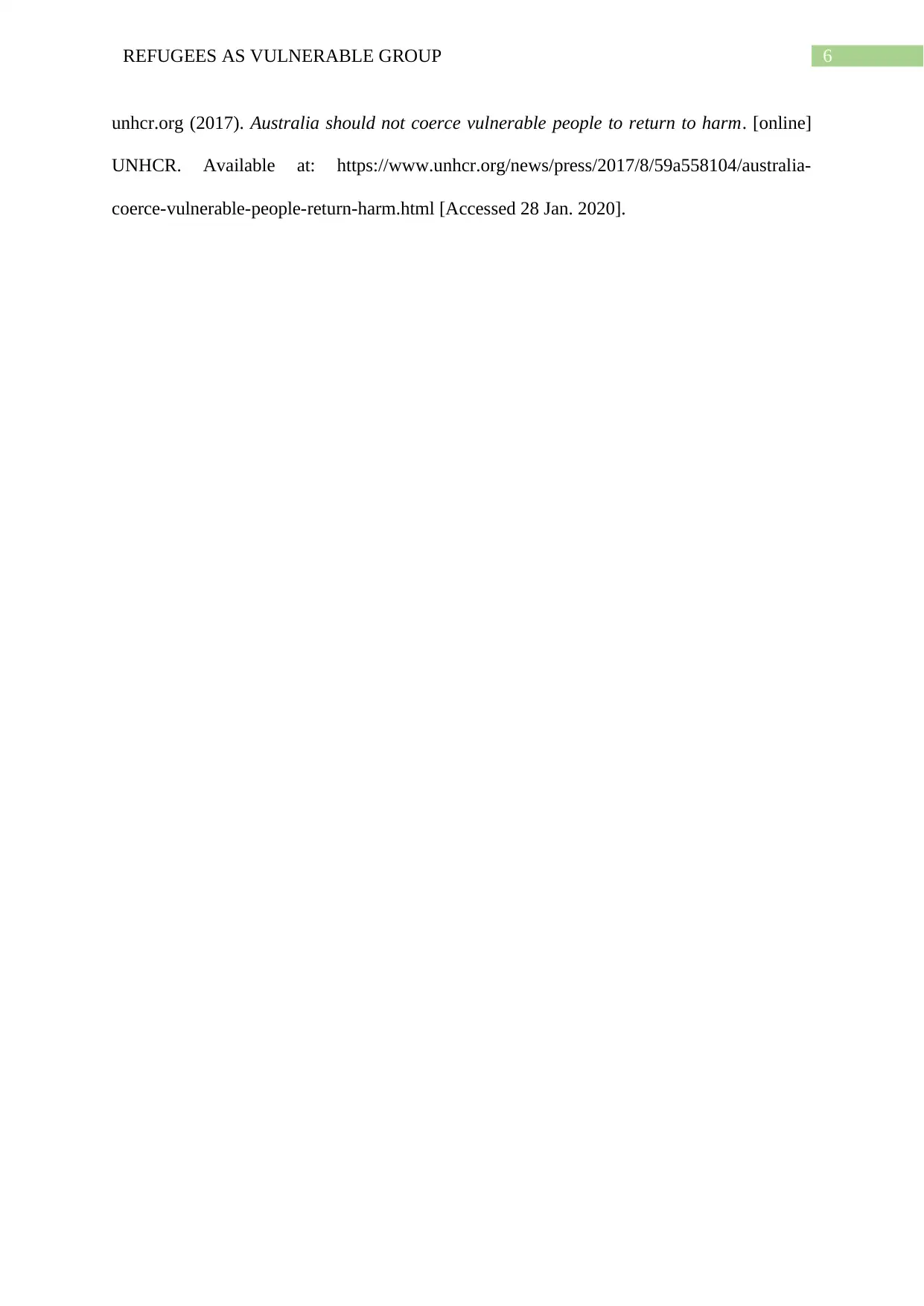
6REFUGEES AS VULNERABLE GROUP
unhcr.org (2017). Australia should not coerce vulnerable people to return to harm. [online]
UNHCR. Available at: https://www.unhcr.org/news/press/2017/8/59a558104/australia-
coerce-vulnerable-people-return-harm.html [Accessed 28 Jan. 2020].
unhcr.org (2017). Australia should not coerce vulnerable people to return to harm. [online]
UNHCR. Available at: https://www.unhcr.org/news/press/2017/8/59a558104/australia-
coerce-vulnerable-people-return-harm.html [Accessed 28 Jan. 2020].
1 out of 7
Related Documents
Your All-in-One AI-Powered Toolkit for Academic Success.
+13062052269
info@desklib.com
Available 24*7 on WhatsApp / Email
![[object Object]](/_next/static/media/star-bottom.7253800d.svg)
Unlock your academic potential
Copyright © 2020–2026 A2Z Services. All Rights Reserved. Developed and managed by ZUCOL.





